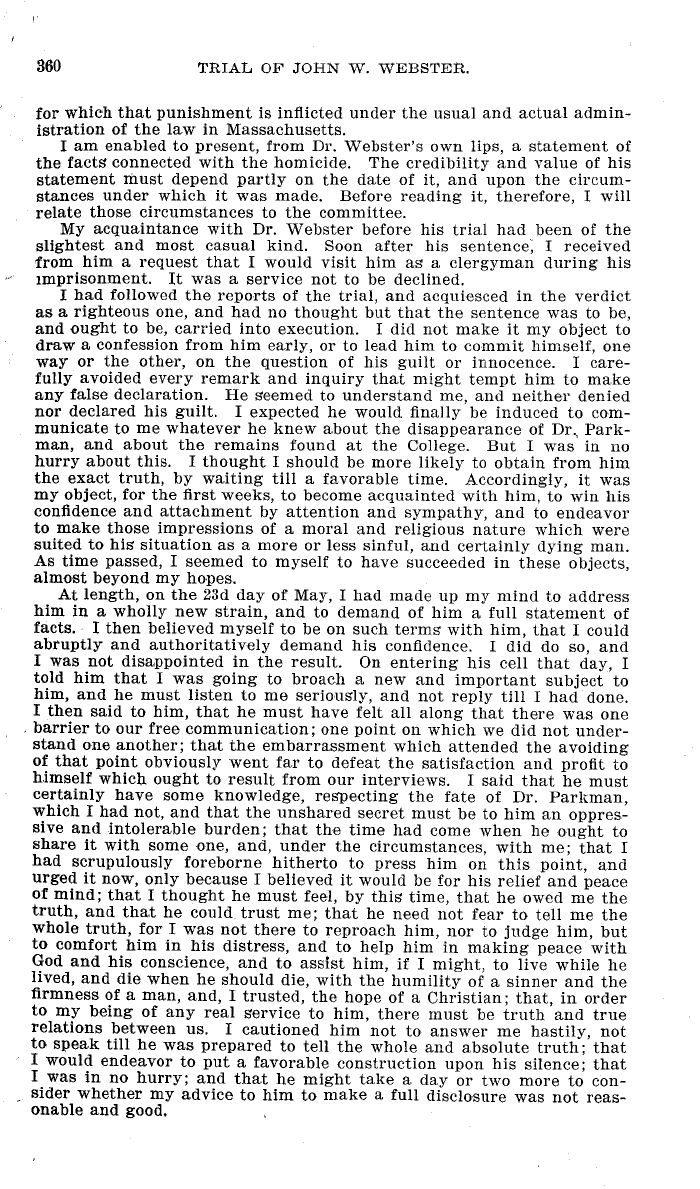|
360 TRIAL OF JOHN W. WEBSTER.
for which that punishment is inflicted under the usual and actual admin-
istration of the law in Massachusetts.
I am enabled to present, from Dr. Webster's own lips, a statement of
the facts connected with the homicide. The credibility and value of his
statement must depend partly on the date of it, and upon the circum-
stances under which it was made. Before reading it, therefore, I will
relate those circumstances to the committee.
My acquaintance with Dr. Webster before his trial had been of the
slightest and most casual kind. Soon after his sentence, I received
from him a request that I would visit him as a clergyman during his
imprisonment. It was a service not to be declined.
I had followed the reports of the trial, and acquiesced in the verdict
as a righteous one, and had no thought but that the sentence was to be,
and ought to be, carried into execution. I did not make it my object to
draw a confession from him early, or to lead him to commit himself, one
way or the other, on the question of his guilt or innocence. I care-
fully avoided every remark and inquiry that might tempt him to make
any false declaration. He seemed to understand me, and neither denied
nor declared his guilt. I expected he would finally be induced to com-
municate to me whatever he knew about the disappearance of Dr. Park-
man, and about the remains found at the College. But I was in no
hurry about this. I thought I should be more likely to obtain from him
the exact truth, by waiting till a favorable time. Accordingly, it was
my object, for the first weeks, to become acquainted with him, to win his
confidence and attachment by attention and sympathy, and to endeavor
to make those impressions of a moral and religious nature which were
suited to his situation as a more or less sinful, and certainly dying man.
As time passed, I seemed to myself to have succeeded in these objects,
almost beyond my hopes.
At length, on the 23d day of May, I had made up my mind to address
him in a wholly new strain, and to demand of him a full statement of
facts. I then believed myself to be on such terms with him, that I could
abruptly and authoritatively demand his confidence. I did do so, and
I was not disappointed in the result. On entering his cell that day, I
told him that I was going to broach a new and important subject to
him, and he must listen to me seriously, and not reply till I had done.
I then said to him, that he must have felt all along that there was one
barrier to our free communication; one point on which we did not under-
stand one another; that the embarrassment which attended the avoiding
of that point obviously went far to defeat the satisfaction and profit to
himself which ought to result from our interviews. I said that he must
certainly have some knowledge, respecting the fate of Dr. Parkman,
which I had not, and that the unshared secret must be to him an oppres-
sive and intolerable burden; that the time had come when he ought to
share it with some one, and, under the circumstances, with me; that I
had scrupulously foreborne hitherto to press him on this point, and
urged it now, only because I believed it would be for his relief and peace
of mind; that I thought he must feel, by this time, that he owed me the
truth, and that he could trust me; that he need not fear to tell me the
whole truth, for I was not there to reproach him, nor to judge him, but
to comfort him in his distress, and to help him in making peace with
God and his conscience, and to assist him, if I might, to live while he
lived, and die when he should die, with the humility of a sinner and the
firmness of a man, and, I trusted, the hope of a Christian; that, in order
to my being of any real service to him, there must be truth and true
relations between us. I cautioned him not to answer me hastily, not
to speak till he was prepared to tell the whole and absolute truth; that
I would endeavor to put a favorable construction upon his silence; that
I was in no hurry; and that he might take a day or two more to con-
sider whether my advice to him to make a full disclosure was not reas-
onable and good.
|

